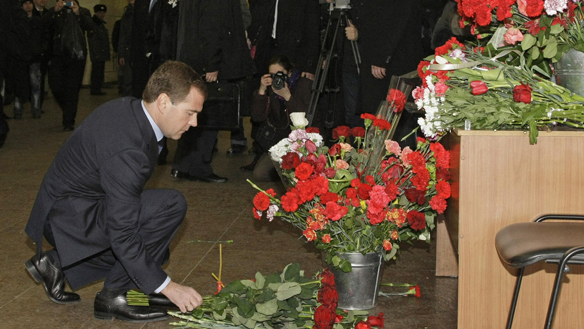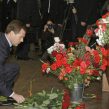
Medvedev Struggles to Demonstrate Leadership in Combating Terrorism
Publication: Eurasia Daily Monitor Volume: 7 Issue: 65
By:

The two terrorist attacks on the Moscow metro last Monday were certainly a shock to Muscovites, who had to re-live the nightmare of 2002-2004, when suicide bombings were a permanent feature of their lives. The double suicide attack in Kizlyar, Dagestan last Wednesday, while not necessarily part of the same campaign, proved that the escalation of violence in the North Caucasus, which most Russians had been inclined to ignore, could not be contained within the region (Vedomosti, April 1). President, Dmitry Medvedev, recognizes that it is imperative to take charge of a renewed struggle against terrorism, and this “re-securitization” of the political agenda could change the character of his still fledgling leadership.
Medvedev responded very swiftly and publicly to this turn of events, attending the Lubyanka station to lay flowers at the site of the first attack, and making a sudden visit to Dagestan; he opted not to deliver a special address to the nation, but issued several strongly-worded statements. Prime Minister, Vladimir Putin, also commented on events, but Medvedev has clearly taken the lead in addressing the recurrent grave threat (Rossiyskaya Gazeta, April 1). He has not dropped even the slightest hint that the victory in suppressing insurrection in Chechnya, about which Putin boasted during the 2007 Munich security conference, has turned out to be completely false. Meanwhile, he has attempted to shape his response differently from Putin’s traditional line. For once, Medvedev has refrained from emphasizing external ties and sources of terrorism, which Foreign Minister, Sergei Lavrov, mentioned while meeting with his G8 colleagues (RIA Novosti, March 30). He said nothing about the “Georgian connection,” which was alleged by Nikolai Patrushev, the Secretary of the Security Council (Vremya Novostei, April 1).
Medvedev finds it necessary to talk tougher than Putin, promising to exterminate terrorists and to destroy “every last one of them,” rather than bringing them to justice. He also seeks to expand the list of “permissible” methods in fighting terrorism, arguing that they “must be both more effective and more rigorous, one might even say harsh.” The main target of these merciless methods are accomplices, and Medvedev insists that “even those who do no more than cook soup and wash clothes” should be treated as members of terrorist groups that have “committed a clear and specific criminal act.”
What makes this brutal rhetoric less convincing is the extraordinary vagueness in defining the adversary and explaining the causes that drive the new wave of terrorism. Terms like “separatists” or “rebels” are banned from the official vocabulary, and it is also prohibited to mention “shahids” or “Wahhabism” or even “Islamic radicalism” (www.gazeta.ru, April 2). Medvedev wants to introduce an “appropriate terminology,” but uses only meaningless expressions such as “scum” or “animals.” This poverty of discourse arouses irritation against the media, which insists on spelling problems out. Consequently, Boris Gryzlov, the Speaker of the State Duma, alleged that Vedomosti and Moskovsky Komsomolets were “inked with actions of terrorists.” Both newspapers responded in no uncertain terms and Gryzlov, despite his parliamentary immunity, could face slander charges (Vedomosti, Moskovsky Komsomolets, April 2).
Medvedev also attempts to distance himself from such squabbles, insisting that it is “absolutely normal” that “the media criticize the law enforcement and security services and the authorities in general.” Equally, his own style of engagement with the media has become visibly less open and flexible. He no longer grants lengthy interviews to TV channels or visits newspapers like Novaya Gazeta; his blog remains open, but the entries are just fragments from various formal statements and opening remarks, while the comments are suspiciously uncritical. That is hardly a sign of him “growing in the job,” but rather a symptom of retreating into a “comfort zone” inside the circle of Kremlin sycophants, who never raise difficult questions.
Medvedev has not yet shut himself away completely from the sub-surface concerns within society, and he tries to impede the xenophobic reaction to terrorism by insisting that “people who live here in the Caucasus are the citizens of our nation, not ‘immigrants’ from the North Caucasus.” Even before the Moscow explosions, some 70 percent of Russians saw the situation in the North Caucasus as tense or explosive, and only 22 percent expected improvement (www.levada.ru, March 30). The new attacks signify a major failure of Putin’s strategy in the region, which combined two key elements: brutal suppression of resistance, and generous distribution of federal funds among local elites. Medvedev cannot invent any alternative, nor fail to see that neither effort is sustainable: the law enforcement structures have become too corrupt to provide efficient suppression, and the depleted federal budget cannot afford new increases in allocating uncontrollable funds (Ezhednevny Zhurnal, April 2).
There is a clear risk that the security threats emanating from the North Caucasus could once again determine and shape the trajectory of Russia’s development (Nezavisimaya Gazeta, April 2). The reaction to the new wave of terrorism in society is inevitably blended with the discontent caused by the recession that appears set to continue, despite the upbeat government forecasts. One particularly troublesome side of this interplay is the terrorist attacks have revealed a peculiar side of the extra-deep social inequality in Russia: the elites, who do not use the metro and live in walled “villages,” are safe and see no need to change their arrogant lifestyle (www.gazeta.ru, March 30).
This selective insecurity makes the propaganda appeals for social unity against terrorism hollow and false, while the passive isolation of society from the state evolves into potential antagonism. Medvedev’s attempts to assert his leadership by presiding over a broad mobilization against an urgent threat are frustrated by the lack of interest within the corrupt elites, and the absence of trust in the divided and disoriented society. The necessary shift of priority to security matters obviously does not help the “modernization” agenda, which implies a departure from bureaucratic omnipotence, but neither could it impel a return to a state-centric model. The social contract that combines petro-prosperity with quasi-democracy has expired, but Russia –much like its state-controlled TV, which for several hours remained silent about the bombings on the metro– is still trying to ignore the breakdown of Putinism.




